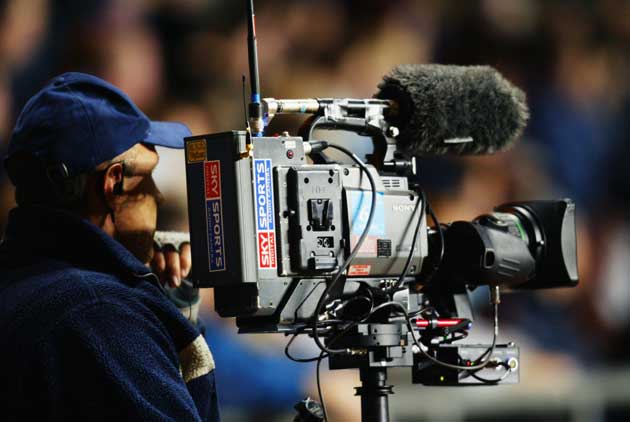Premier League to cash in on TV windfall
New rights deal with Sky proves top flight remains immune to credit crunch

Your support helps us to tell the story
From reproductive rights to climate change to Big Tech, The Independent is on the ground when the story is developing. Whether it's investigating the financials of Elon Musk's pro-Trump PAC or producing our latest documentary, 'The A Word', which shines a light on the American women fighting for reproductive rights, we know how important it is to parse out the facts from the messaging.
At such a critical moment in US history, we need reporters on the ground. Your donation allows us to keep sending journalists to speak to both sides of the story.
The Independent is trusted by Americans across the entire political spectrum. And unlike many other quality news outlets, we choose not to lock Americans out of our reporting and analysis with paywalls. We believe quality journalism should be available to everyone, paid for by those who can afford it.
Your support makes all the difference.Recession? What recession? The Premier League last night appeared to be on the brink of declaring itself effectively immune to the direst effects of the global economic downturn when it struck another lucrative TV deal with BSkyB for live British TV rights for three seasons from 2010. The Independent understands that the deal – for four rights' packages of six available – is worth close to the £1.3bn the broadcaster paid for its current rights, for 2007-10.
The importance of the rights' sale cannot be overstated. In short, huge TV income equals big-name players on big wages, competitiveness in Europe, and success by various definitions.
Last time Sky paid £1.314bn for four packages. Each then comprised 23 games, with the most expensive a prime-choice package of 4pm Sunday games, with the rest a mixture of midweek evenings, bank holidays and Saturdays. The League announced last night that BSkyB had been awarded four of six available packages of rights again, without detailing the games.
No figures for the new deal will be confirmed until the bidding process has been concluded for the remaining two packages, but industry sources believe the rights values overall have held up. "It looks like Sky have got the same four packages that they got last time, and for a similar price," one source said.
Another source said: "It was always obvious that Sky would be at the forefront of the bidding because live Premier League football remains core to Sky's business.
"Even with the tough economic climate, it was never going to make sense for Sky to bid much lower, or indeed any lower than last time, because by definition that would lead to them potentially damaging a key product.
"Sky's investment in the Premier League has been important to the League's growth and success over the years. The football remains very important for Sky. So why would Sky do anything to damage that?"
If the proceedings required a note of intrigue above and beyond confirmation of precisely what Sky has paid, it was added with the announcement that the remaining two packages of live British rights will go to a second round of bidding "in due course."
Under the current deal (2007-10), the Ireland-based pay-TV operator Setanta owns the rights to the two packages not held by Sky, and it is believed that Setanta again made a competitive bid for the same packages for 2010-13. But it is not certain whether Setanta's bid matched the £392m it paid for two packages last time, nor whether Setanta had any rival bidders.
It was widely anticipated that the Disney-owned American sports network ESPN would enter the market for UK rights, and a second round of bidding for the remaining packages can mean only one of three things.
Either the rights did not attract much competition at all, and therefore did not meet an undisclosed "reserve price" that the Premier League is able to set, and thus the League has opening a second round of bidding to squeeze out higher bids.
Scenario two is that Setanta had a serious rival, and the respective offers from the bidding broadcasters were within 10 per cent of each other in value. If that was the case, the League – or more specifically its chief executive, Richard Scudamore – would have ordered that the bidding companies re-submit their offers.
Scenario three is that Setanta and ESPN were bidding together, or rather that one firm was fronting a bid on behalf of both in anticipation of some kind of partnership or merger, and there were unsubstantiated suggestions this was causing delays. However, one source told The Independent this was not the case, and suggested that ESPN had not made a serious bid at all. Some of ESPN's key executives scheduled this week to take part of their annual leave, which hardly suggests they were preparing for the celebration of the acquisition of a share of the most valuable sports rights anywhere on the planet outside of America's NFL.
As The Independent revealed at the time, the League sent out its tender documents for the rights back in December. Interested parties had until 11am yesterday morning to submit their sealed bids to the City offices of the accountants KPMG, where Scudamore and his team of rights' sellers from the League spend much of yesterday pouring over the fine print of the offers and weighing up the bids.
The League made £2.7bn from all media rights for the seasons 2007-10, £1.7bn from live domestic rights (£1.3bn from Sky, £0.4bn from Setanta), £650m from overseas rights and the balance from highlights deals including with the BBC for Match of the Day, which was renegotiated last week for 2010-13 at a marginally higher price than 2007-10.
Recession? What recession?
1.3
Value of new deal believed agreed with BSkyB in billions of pounds.
Join our commenting forum
Join thought-provoking conversations, follow other Independent readers and see their replies
Comments